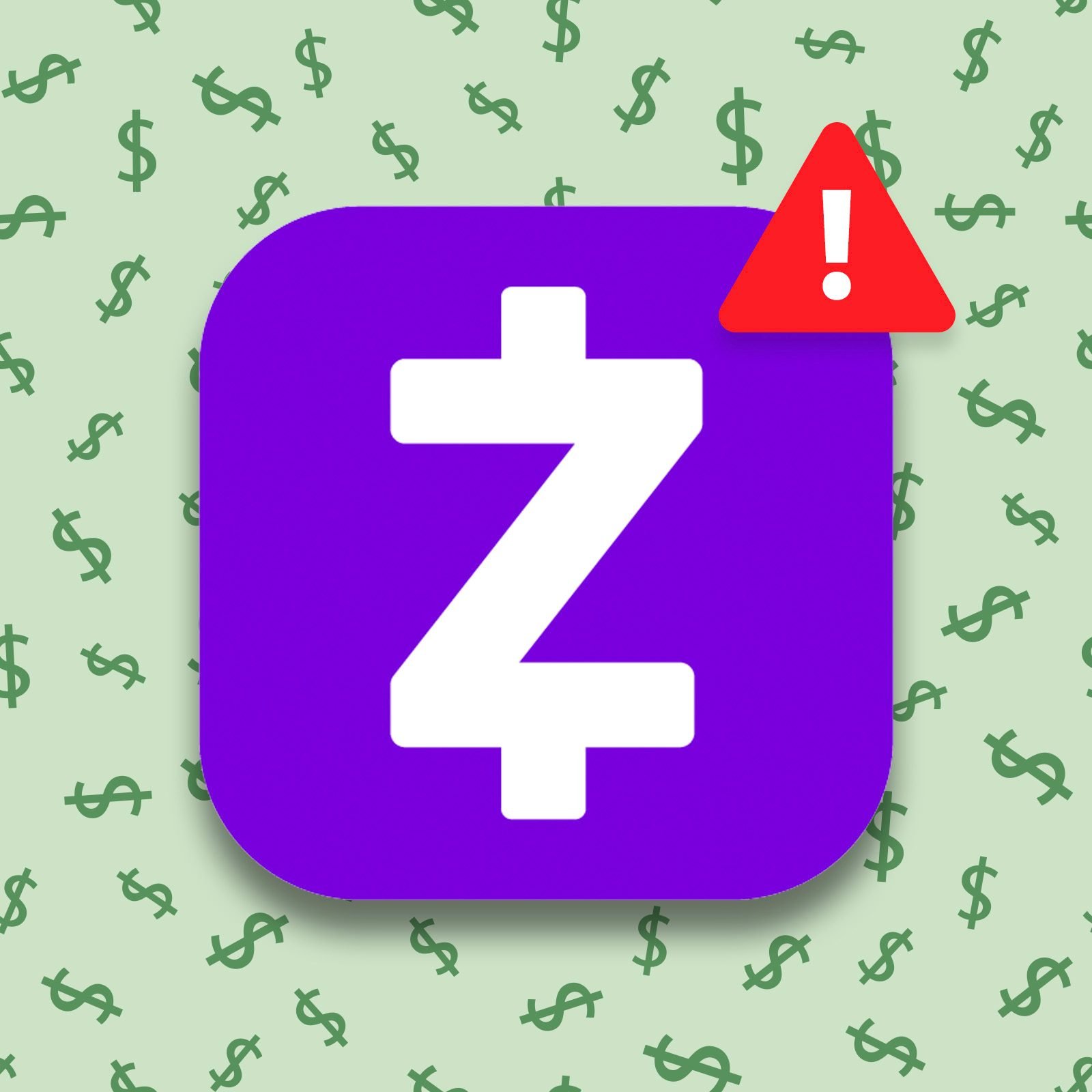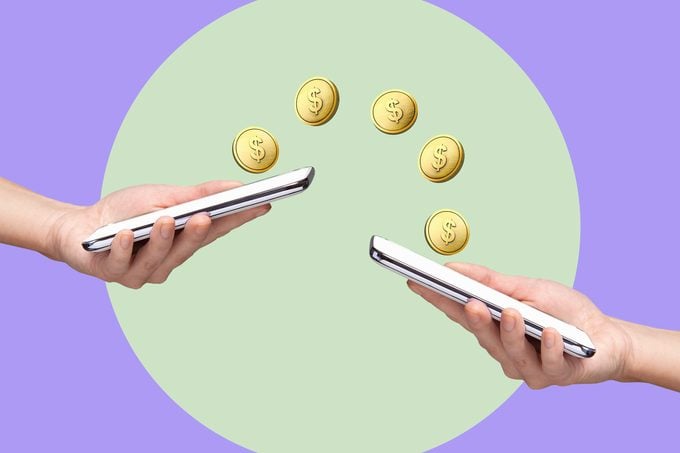Because Zelle is an easy way to send and receive money, it's also an easy way for hackers to steal it. Here’s how to protect yourself from Zelle scams.

9 Common Zelle Scams to Watch Out For

The pandemic normalized contactless payments, and digital wallet options have popped up everywhere, including places that used to only accept cash—like farm stands, garage sales and even your babysitter. While this is incredibly convenient, it also leads to unsuspecting people becoming victims of scams, and wherever we turn, there seems to be another one—cash app scams, online scams, Venmo scams, Facebook Marketplace scams and, now, Zelle scams.
“Over 100 million people use Zelle to transfer nearly $500 billion annually, which is a staggering amount of money,” says Monica Eaton, COO of Chargebacks911. “So, naturally, when you have that many people transferring that much wealth, it’s going to attract the attention of hackers, criminals and cyberthieves.”
To help you stay safe, we’ve identified the most common Zelle scams you might encounter, as well as provided information on what to do if you accidentally fall for one. And remember: Scammers are sneaky, but if something seems off about a monetary transaction, it probably is.
Get Reader’s Digest‘s Read Up newsletter for more tech, cleaning, travel and fun facts all week long.
What is Zelle?

Zelle is a P2P (peer-to-peer) system that allows you to send money quickly and conveniently from your credit card or bank account, only requiring you to enter the recipient’s phone number or email address. Zelle was created in 2017 by the company Early Warning Services (EWS), which is owned by seven of the biggest banks in the United States, including Bank of America and Capital One. Hundreds of banks and credit unions now offer Zelle as a service.
Aside from its ease of use, Zelle’s main draw is the speed at which money can be transferred. “Unlike traditional financial transfers, such as wire transfers, which can take a day or longer to process, Zelle transfers happen instantly,” explains Brian Contos, Chief Security Officer of Phosphorus Cybersecurity in Nashville. “That means once you’ve made a Zelle payment to someone, the money is out of your account and essentially gone—with no way to stop the transaction.”
Zelle only works with bank accounts and debit cards and is designed to move money between bank accounts, so in that sense, Zelle is similar to a cash transaction. “Unlike some other digital payment networks, your money isn’t kept in a separate account with the service,” says Alex Hamerstone, Advisory Solutions Director at TrustedSec.
Who can use Zelle?
“Anyone with a bank account at one of the participating banks can register with and use Zelle,” Hamerstone says. “And additionally, anyone can register with Zelle mobile using a Visa or Mastercard branded debit card.” When using Zelle, at least one side of the transaction (sender or receiver) must have access to Zelle either through their bank or credit union or through the app.
If your bank is partnered with Zelle, you can find Zelle in your banking app. If you’re linking Zelle to a Visa or Mastercard debit card, then you’ll need to download the Zelle app to get started. If you send money through Zelle to someone who isn’t enrolled, they’ll get a notification telling them how to receive the money.
One important note: Zelle isn’t available overseas and can’t be used for international transactions.
What are some common Zelle scams to look out for?
The good news is that Zelle has top-tier security protocols, says Adam Levin, host of the “What the Hack with Adam Levin” podcast. The bad news? Scammers are creative and convincing, and once you send money, you have little recourse to recoup it. “Zelle’s main vulnerability is that payments are instant and irreversible,” explains Ted Rossman, a senior industry analyst at Bankrate. “People love getting paid quickly—like, if I’m reimbursing a friend for my share of a meal—and fraudsters exploit this vulnerability.”
If you lose your phone and have the Zelle app, a criminal can initiate transfers from your account, but in the majority of cases, “Zelle scams boil down to trickery,” Contos points out. “Most of the time, Zelle scams involve social engineering a victim into transferring money to the criminal’s account.” The same is often true of scams involving Apple Pay and Google Pay.
These are the most common Zelle scams:
Impersonation scam
This is probably the most common scam, according to experts, and it has several forms. A scammer will impersonate a friend or family member and say they have an emergency and need money right away. This urgent request may come in an email, text message, direct message on a social media site or even a phone call.
Other times, a criminal will impersonate a legitimate company, organization or government agency and request a payment from you via Zelle. “They could claim that you owe them money for a past due charge, that your water bill is late and the service will be stopped if you don’t pay immediately, that you were short on your taxes, or that you failed to pay a traffic fine and a warrant will be issued for your arrest,” says Contos. “They could also claim to be a charity, a family member who is stranded and in desperate need of help, or use any other con that will pull at your heartstrings.” FYI, be aware of these scam phone numbers.
Romance scam
Catfishing or “romance” scams are also increasing in frequency. In fact, Joe Troyer, CEO of ReviewGrower, says they’re the most common Zelle scams. According to the Federal Trade Commission, “people sent $547 million to online romance scammers last year,” and “in the past five years, people have reported losing a staggering $1.3 billion to romance scams, more than any other FTC fraud category.”
“It all begins with a phony dating profile on one of the many popular social media sites or apps,” Troyer says. “People exchange hundreds of texts with the fraudsters, who are charming and can make people fall in love with them, and then they start asking for money or presents, often requesting cash through Zelle.”
Phishing scam
“In this scam, scammers send emails or text messages that appear to be from a participating financial institution, asking users to click on a link or open an attachment,” explains Daniel Chan, Chief Technology Officer of Marketplace Fairness. “If users do this, they may download malware that can steal their personal information.”
The FBI warns about these phishing scams that “lure you in and get you to take the bait,” noting that any ploy that leads a victim to giving a scammer access to their Zelle account is extra risky. That’s because Zelle payments are fast and irreversible and were designed only to be used between people who know and trust each other.
Fake invoice scam
With this type of scam, scammers send emails or text messages that appear to be from a business that the user does business with. “The email or message will instruct the user to click on a link to view an invoice,” Chan says. “If the user clicks on the link, they’ll be taken to a website that looks like the business’s website. However, this website is a scam site, and if the user enters their personal information, they will give the scammers access to their account.”
Lottery scam
The lottery scam can be used for any prize. In this scam, emails or text messages appear to be from a lottery company or a company offering a prize of some sort. The email or message will ask the user to click on a link to claim their prize and enter their Zelle account to send the “lottery winnings.” Like the fake invoice scam, if the user clicks on the link, they will be taken to a website that looks like the lottery company’s website, and if the user enters their personal information, they will give the scammers access to their account.
Malware scam
Paul Bischoff, a privacy advocate at Comparitech, warns against clicking on links or attachments in unsolicited emails or texts, because they could install malware on your device. “You’re tricked into installing malware,” Bischoff says, “and an attacker could hijack your device and send themselves money from your Zelle app.”
And that’s not all. “More severe malware could hijack banking apps like Zelle and send money directly from your account,” Bischoff adds. “Other malware might just wait for you to log in to your bank account via a web browser so it can steal your password and send it to the attacker. Another strain of malware might redirect you to a phishing site when you try to access your bank’s website or Zelle, which then steals your password and other info.”
Goods-and-services scam
Jim Murphy, Director of Fraud Management North America at D4t4, also warns against the goods-and-services scam. “This happens when you shop online and pay using Zelle and never receive what you paid for,” Murphy says. “The item is usually listed at a discount but only if it’s purchased within a limited time window.”
As Hamerstone warns, be wary of companies or individuals with products that are priced low or are hard to find—and who then push you to pay via Zelle.
Emergency phone scam
“Another thing to watch out for is someone asking to use your phone,” Hamerstone warns. “There have been cases where someone will fake an emergency, ask to use a stranger’s phone and then quickly send a payment to themselves.”
Business account scam
A new kind of scam has been popping up on resale sites like Facebook Marketplace. If you list an expensive item and have a very interested buyer, make sure it’s legit. The Better Business Bureau has warned of fake “buyers” who pretend to pay for an item, then trick you into sending them money back.
After the scammer tells you they want an item, you receive an email that looks like it’s from Zelle, saying the “buyer” paid with a business account and to access the payment, you must also upgrade to a Zelle business account—for $300. The scammer will generously add the $300 onto the “payment” they sent you, as long as you promise to refund them after you upgrade. The “buyer” will use fake emails and screenshots to make it look like they’ve paid you. But when you Zelle the $300 back, you realize the payments were fake, and you’ve just lost your money.
To avoid getting scammed, always check for payments through your Zelle app. Never rely on screenshots or emails as proof, beware of buyers offering more than you listed the item for and don’t agree to refund a payment.
Can Zelle refund my money if I’m scammed?

Because Zelle is intended to be used between people who know each other, and the money goes directly from one bank account to another, there is little to no protection at this time if you fall for a Zelle scam.
“It is important to note the difference between fraud and a scam. In short, if someone gets access to your account without you being involved in any way, that is considered fraud, and you will generally be able to get your money back,” Hamerstone says. “But if you are the victim of a scam—where you are tricked into sending someone money, whether for a product or service that you never received or never even existed—then you are unlikely to get your money back.”
In general, before signing up for any service, read the fine print when it comes to a company’s fraud protection rules. “While PayPal offers significant protection from fraudulent transactions, Zelle, for example, does not offer such protection,” says Steven J.J. Weisman, a lawyer and professor of white-collar crime at Bentley University. “That is why these services should never be used for commercial transactions but only to transfer small amounts of money to people you know.”
Similarly, you likely won’t be able to get your money back if you fall victim to a gift card scam.
What should you do if you’ve fallen for a Zelle scam?
If you’ve been the victim of fraud or a scam, you should report it immediately online to the FBI Internet Crime Complaint Center or call the FBI’s toll-free fraud hotline at 833- FRAUD-11. If you are enrolled in Zelle through your bank, you’ll also need to contact them, but if you’re enrolled with the Zelle app, you can fill out this online form or call 844-428-8542.
If you report a Zelle scam immediately, you may get your money refunded, but some banks are taking the position that the Electronic Transfer Act does not apply to many victims of Zelle scams. “It is a pointing-finger matter,” says Andy Rogers, a senior assessor at Schellman, a cybersecurity company. “Zelle will point to your bank as the one that should do the refunding, and your bank points back to Zelle as the one who should refund the money. ”
How do you avoid Zelle scams?
While anyone can be faced with Zelle scams, there are ways to protect yourself—namely, by familiarizing yourself with the methods criminals may use to trick you. If you get a message with any of the following red flags, there’s a good chance it’s a scam.
A sense of urgency
“Almost all scams involve instilling a sense of urgency in victims,” Bischoff says. “If you feel rushed to make a decision, there’s a strong chance it’s a scam.”
Unsolicited texts or emails
Never click on links or attachments in unsolicited texts or emails. “If you’re unsure whether an email is legitimate, Google your bank’s phone number and call that instead of the number listed in the email,” Bischoff advises.
Only one payment method
Most legitimate businesses accept multiple payment methods. “If Zelle is the only one available to you,” Bischoff says, “it could well be a scam.”
Requests for sensitive information
“To avoid having your Zelle account and other accounts taken over by hackers, never provide your username, password or PIN in response to any email, text message or phone call unless you have absolutely confirmed that the request for this information is legitimate, which it never is,” Weisman says. “Even if you get a call that appears to come from your bank or other company with which you do business, your Caller ID can be tricked by spoofing to make the call appear legitimate when it is not.”
Sources:
- Monica Eaton, COO of Chargebacks911
- Brian Contos, Chief Security Officer of Phosphorus Cybersecurity
- Alex Hamerstone, Advisory Solutions Director at TrustedSec
- Adam Levin, host of the “What the Hack with Adam Levin” podcast
- Ted Rossman, senior industry analyst at Bankrate
- Joe Troyer, CEO and growth advisor of ReviewGrower
- FTC: “Reports of romance scams hit record highs in 2021”
- Daniel Chan, Chief Technology Officer of Marketplace Fairness
- FBI: “Spoofing and Phishing”
- Better Business Bureau: “BBB Scam Alert: Crafty new scam targeting Facebook Marketplace sellers”
- Paul Bischoff, a privacy advocate at Comparitech
- Jim Murphy, Director of Fraud Management North America at D4t4
- Steven J.J. Weisman, a lawyer and professor of white-collar crime at Bentley University
- Andy Rogers, senior assessor at Schellman























